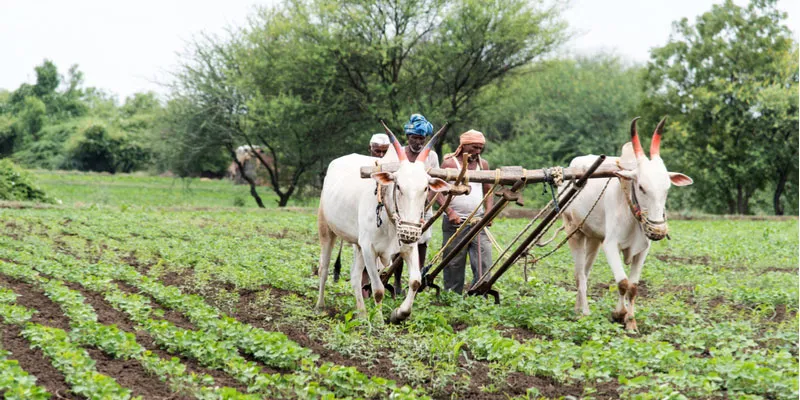[Startup Bharat] How agritech platform Gramophone increased crop yield for 5L farmers in MP
Indore-based agritech startup Gramophone has built a platform that helps farmers get personalised agri advice on crops, soil, weather, etc through a mobile app. It has mapped over 2.5 million acres of agricultural land.
When IIT-Kharagpur alumni Tauseef Khan and Nishant Vats Mahatre started in 2016, agritech was still a nascent sector in India.
Agriculture was done in conventional ways, most farmers in India were deprived of connectivity, and a vast majority of farmlands in the country remained untouched by the modern agri trade.
Tauseef, who’d had stints at agri-focussed VC funds like Omnivore Partners and Aspada Investments, was well-versed with the issues plaguing the agriculture sector, which contributes 17-18 percent to India’s GDP. His co-founder Nishant, too, had experience in agri consulting and investing.

Gramophone Co-founders Harshit Gupta, Tauseef Khan, Ashish Rajan Singh, and Nishant Vats Mahatre
With 160 million hectares of arable land, India is the world’s second-largest agricultural market after the US, according to Bain & Company. But crop yield and farmer incomes still remain low.
Tauseef and Nishant believed that technology could bring a change by eliminating information asymmetries in the agricultural system, and making farming more profitable, predictable, and productive.
This became the founding philosophy of Indore-based Gramophone. They also roped in Harshit Gupta and Ashish Rajan Singh as co-founders.
Bringing tech-based agronomy to farmers
Gramophone built an intelligent farming platform that provides farmers crop advisory, agronomy advice, dynamic weather and price updates, learnings on crop diseases, and recommendations on agri inputs and machinery to help them plan their sowing and harvesting cycle better.
The farmers just have to key in basic information like crop type, date of sowing, and the size of farmland for Gramophone to throw up actionable insights on crop and soil.
The startup also provides guidance on what nutrients to add to a crop, what crop diseases to protect from, soil management techniques, best prices for agri inputs, etc.
Gramophone’s Krishi Mitra app serves as the point of access for farmers. Even those without smartphones can connect with agri experts and agronomists on Gramophone through a missed-call system.

Tauseef Khan, Co-founder and CEO, Gramophone
Co-founder and CEO Tauseef tells YourStory,
“Agronomy is one of the most crucial aspects because customer stickiness depends on that. Our internal engine determines parameters like soil, weather, crop type, and their interdependence. The insights are personalised to the farm level, and the platform can make human-like interventions in the crop cycle.”
Not only this, but to enable further ease of use, Gramophone also allows farmers to send a picture of their crop on WhatsApp to request inputs from agri experts. The platform uses advanced image recognition technology to process farmer queries and throw up relevant information.
Tauseef adds, “We’re also enabling remote soil testing through sensors and farmers can get the entire soil map and specifications on the app.”
Essentially, Gramophone serves as a farmer’s pocket tutorial.

While tech-based crop advisory is one component of Gramophone’s business, the other is a mobile-led agri marketplace, which connects farmers with traders and distributors of agri inputs as well as with fellow farmers through a social network.
The farmers get access to a wide range of inputs and implements, including seeds, fertilisers, nutrients, pesticides, and farming equipment. Gramophone assures them the best price as it eliminates the middlemen in the selling process. Farmers gain a 20-30 percent cost benefit on its marketplace over traditional mandis.
Not only has Gramophone managed to streamline the agri value chain, but it has also increased farm yields. The founders share that soya bean farmers in Madhya Pradesh have reported a 20 percent growth in yield, and wheat farmers have seen yields go up by almost 40 percent after they started using the Gramophone app.

Operational growth and business model
Gramophone’s growth peaked 2018 onwards as the focus on agritech grew in India with more investments flowing in.
It expanded its farmer network to 5,00,000 from 1,20,000 in the last two years, and witnessed a revenue jump of 8X.
The COVID-19 intervention has expectedly affected Gramophone, which is operating at 15-20 percent capacity. However, with agriculture being one of the “essential sectors” of the Indian economy, the startup is projecting a 3X revenue growth in 2020.
“We started generating enough demand in May by converting on-ground farm work to digital. Earlier, there was some resistance from farmers to come online, but the pandemic has changed that,” the founder says.

A farmer who has benefited from Gramophone
At present, about 2.5 million acres of farmland is mapped on the Gramophone platform. While it is operational only in Madhya Pradesh, it looks to enter Rajasthan, and a few other neighbouring states by 2021.
Tauseef elaborates,
“Since 2019, we’ve adopted a micro-market strategy similar to the OYO model. There is a common last-mile delivery network for two to three districts in a state. It helps cut costs, makes each cluster operationally profitable, and also allows us to go deeper in every geography. This model makes sense because farming patterns, weather, and soil types change every 100-odd kilometres in India.”
Gramophone states that it has “captured” MP with 10 micro markets and physical retail “hubs” that act as distribution and demand generation centres. These micro markets will triple as it expands to other states.

Gramophone publishes a newspaper for farmers.
Even though its Krishi Mitra app is free, Tauseef reveals that farmers are increasingly warming up to the idea of a subscription-based yearly crop advisory and schedule.
“We also plan to bring innovations like soil-testing-as-a-service and farm finance from NBFCs, with options like pay later. Lending companies can reach out to farmers through our network. Data is the key oil and we will keep building adjacent linkages around it,” explains the founder.
Gramophone also earns a transaction fee from agri distributors who sell their products through its m-commerce marketplace.
The startup has even “closed” partnerships with bulk suppliers of agri inputs. “These players are seeing a lot of value in the connectivity with farmers,” Tauseef says.
Funding and the agri-market opportunity
Before institutional funding came along, Gramophone was backed by a slew of high-profile angels, including Ravi Garikipati, ex-CTO of ; Ajith Pai, Director of Green Earth; Sanjay Ramakrishnan, former head of product marketing at Flipkart, and others.
In August 2018, the startup raised $1 million (about Rs 6.5 crore) in Pre-Series A funding led by Info Edge (owner of job portal Naukri.com and real estate marketplace 99acres.com). Later in April 2019, Info Edge invested an additional Rs 14 crore, taking its shareholding in Gramophone to about 33 percent.
Kitty Agarwal, Partner, Info Edge Ventures, said in a statement,
“We have invested in Gramophone because it has a great team working on an innovative concept. They are solving problems of real India by helping farmers in improving their livelihoods and awareness.”
In August 2019, the startup went on to raise Rs 24 crore in a Series A round from Info Edge, Asha Impact, and Better Capital. Gramophone plans to deploy the capital to build its product, data science, and also scale operations across geographies.

Kartik Desai, Executive Director of Asha Impact, stated, “We were impressed by the Gramophone team’s intuitive understanding of customers’ needs, and by their ability to build a highly effective and scalable platform.”
Gramophone is also looking to raise a Series B round by the end of 2020.
The startup competes with the likes of Plantix, AgNext, , , , and others in a rapidly growing sector. India counts over 450 agritech startups, according to NASSCOM. These companies are increasingly empowering 150 million-odd farmers with data-led systems.
About 60 percent of India’s population is directly dependent on agriculture. But despite the enormous importance of the sector, it remains a largely untapped and underserved market, with vast segments of agricultural land dependent on manual labour.
Therein lies Gramophone’s opportunity.
Tauseef sums up with, “We’re on a mission to create the future of farming by democratising knowledge, building transparency in transactions, and creating a connected ecosystem for farmers’ business. The goal is to change the ad-hoc reactionary approach to farming to a planned and preventive one.”
(Edited by Teja Lele Desai)


![[Startup Bharat] How agritech platform Gramophone increased crop yield for 5L farmers in MP](https://images.yourstory.com/cs/2/dc9aa1302d6c11e9aa979329348d4c3e/WhatsAppImage2020-06-25at4-1593081675909.jpeg?mode=crop&crop=faces&ar=2%3A1&format=auto&w=1920&q=75)








